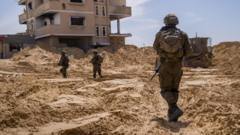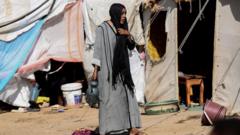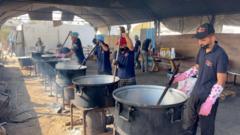In the heart of Khartoum, amidst relentless violence, families grapple with severe food shortages as U.S. funding for aid programs has dwindled alarmingly. The closure of crucial soup kitchens feeds the tragic cycle of starvation among families like Khadija Mousa and her sickly daughter, Fatima.
### Sudan's Humanitarian Crisis Deepens as Aid Cuts Take Toll on Vulnerable Populations

### Sudan's Humanitarian Crisis Deepens as Aid Cuts Take Toll on Vulnerable Populations
The impact of substantial cuts to U.S. foreign aid is acutely felt in Sudan, where civil war and humanitarian disasters converge, leaving millions at risk.
In Khartoum, the civil war's impact is devastating, compounded by a humanitarian crisis affecting over half of Sudan's population. Local health workers report a spike in severe malnutrition and child mortality as aid operations falter.
---
In the war-torn capital of Sudan, Khartoum, devastating scenes unfold as the humanitarian crisis escalates due to drastic cuts in U.S. foreign aid. In the Jereif West neighborhood, Khadija Mousa is seen comforting her infant daughter Fatima, who suffers from severe malnutrition. The freezing of American aid, enacted by former President Trump, has caused a catastrophic ripple effect, leaving communities grappling with dire shortages.
The closure of American-funded soup kitchens is a direct consequence of the slashing of U.S. aid. Local health practitioners, witnessing the plight firsthand, recount the tragic deaths of dozen young children, including 18-month-old Abdo, who succumbed to starvation after aid programs were halted. These soup kitchens had served as vital lifelines for families facing the relentless backdrop of violence and food insecurity wrought by the ongoing civil conflict.
As the conflict continues, Sudan is enveloped in a staggering humanitarian disaster, with over 25 million people, more than half of the nation’s population, classified as acutely hungry. This situation underscores a distressing paradox: amidst military victories in certain regions, the civilian toll grows, with aid cuts amplifying the already desperate circumstances faced by millions.
With soup kitchens shuttered and funds critically low, the situation in Sudan exemplifies the harsh realities of war compounded by the withdrawal of international support, pushing the nation into greater suffering and adversity as families like Khadija's continue to hope for a semblance of relief.
---
In the war-torn capital of Sudan, Khartoum, devastating scenes unfold as the humanitarian crisis escalates due to drastic cuts in U.S. foreign aid. In the Jereif West neighborhood, Khadija Mousa is seen comforting her infant daughter Fatima, who suffers from severe malnutrition. The freezing of American aid, enacted by former President Trump, has caused a catastrophic ripple effect, leaving communities grappling with dire shortages.
The closure of American-funded soup kitchens is a direct consequence of the slashing of U.S. aid. Local health practitioners, witnessing the plight firsthand, recount the tragic deaths of dozen young children, including 18-month-old Abdo, who succumbed to starvation after aid programs were halted. These soup kitchens had served as vital lifelines for families facing the relentless backdrop of violence and food insecurity wrought by the ongoing civil conflict.
As the conflict continues, Sudan is enveloped in a staggering humanitarian disaster, with over 25 million people, more than half of the nation’s population, classified as acutely hungry. This situation underscores a distressing paradox: amidst military victories in certain regions, the civilian toll grows, with aid cuts amplifying the already desperate circumstances faced by millions.
With soup kitchens shuttered and funds critically low, the situation in Sudan exemplifies the harsh realities of war compounded by the withdrawal of international support, pushing the nation into greater suffering and adversity as families like Khadija's continue to hope for a semblance of relief.




















